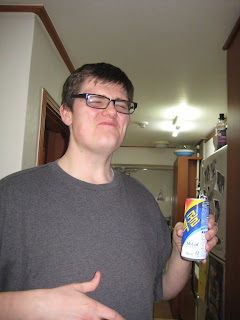I've taken to writing on my hand a lot because I realize that I forget little things that happen during the day.
Last week, while I was sitting at the computer between classes, Leah and Iris (two of my favorite older students) came up to me. Iris stood in front and translated for Leah, who is a good speaker, but very shy out of class. She said that the moon is full and Leah would like me to go with her. At first, I was a little confused, but then Iris clarified by saying that Leah wanted to show me the moon. So, I followed them to the hallway and we peered out the tiny window at the yellowish full moon. I told them that a large, yellow full moon is called a harvest moon in English. Leah thanked me (when she was the one who wanted me to see the lovely moon) and the girls went on their way. For all the difficult times and as much as we don't fit in to the business culture here, the students always have ways to make it worthwhile. I never really planned to work with kids (and, to be honest, I don't plan to after this), but my students are one of the reasons I am happy I'm doing this (and will be happier still when it's over).
In my Essential 2 class (12-13 year olds) our current chapter in the book is called "Family Problems." It's a terrible topic with few spin offs. Mostly it makes for choreographed dialogue and awkward questions between my students. One of the questions the books asks is, "What happens when someone in your family doesn't listen?" It took me about two minutes to explain this question and then I just gave up and had them look up "punishment" in their electronic dictionaries. All six students agreed that their parents hit them when they misbehave. Unfortunately, their English skills aren't such that I could get any further detail about that. One student, Logan, asked me what my parents did when I was a kid and I didn't listen. I told him that they didn't hit me, but instead took away the t.v., phone and computer. He was floored. Twice he asked me to confirm that they didn't hit me. The other students seemed equally impressed. I knew that corporal punishment was acceptable in Korean classrooms (ruler to the knuckles being the most common), but I hadn't thought about it outside that realm. Koreans are so subdued in public (no one argues or even gets excited, save the ladies in the locker room at the gym), it's difficult to imagine them punishing their kids physically.
I had another humorous mispronunciation in one of my Beginner 2 (8-10 year olds) classes today. The students were working with food and asking each other "Do you like ___?" and throwing the ball. It's always the same foods in these books: spaghetti, sandwiches, pizza, milk, cake, and cheese. So, I have the students think of more foods and write them on the board. While 'bulgogi' and 'kimbap' may not help them with their English, it at least makes the subject more tangible for them. The comical mispronunciation came from the youngest student in the class, Cameron. He is bullied, so I brought as little attention to it as possible.
Cameron: Do you like ass?
(silence)
Cameron: Do you like ass?
Me: Do you mean eggs?
Cameron: Yes! Ass!
Good night!
(silence)
Cameron: Do you like ass?
Me: Do you mean eggs?
Cameron: Yes! Ass!
Good night!



















































